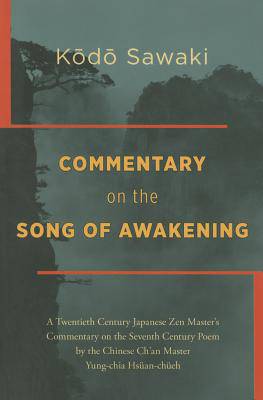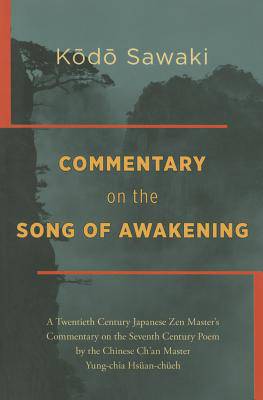
- Retrait gratuit dans votre magasin Club
- 7.000.000 titres dans notre catalogue
- Payer en toute sécurité
- Toujours un magasin près de chez vous
- Retrait gratuit dans votre magasin Club
- 7.000.000 titres dans notre catalogue
- Payer en toute sécurité
- Toujours un magasin près de chez vous
Commentary on the Song of Awakening
A Twentieth Century Japanese Zen Master's Commentary on the Seventh Century Poem by the Chinese Ch'an Master Yung-Chia Hsuan-Chueh
Kodo Sawaki
Livre broché | Anglais
53,45 €
Format
Description
The Song of Awakening (chin. Cheng-tao ke, jap. Shōdōka), is a seminal text within early Chinese Chan (jap. Zen). Written in the seventh century by the Chinese master Yung-chia Hsüan-chüeh (Jap. Yōka Genkaku, known familiarly as Yōka Daishi), this superb poem resonates with Yōka Daishi's great awakening to the truth of reality. As such, it has had a deep influence on the understanding and practice of a long line of Chinese and Japanese Zen masters and practitioners.
Kōdō Sawaki uses the poetic expression of Shōdōka as a springboard for a wide-ranging commentary that not only elucidates the poem, but adds a rich background of Buddhist teachings and emphasizes Sawaki Roshi's focus on upright sitting in the zazen posture as the seat of realization. Filled with humor, Japanese folk history, and sometimes a no-holds barred critique of academic and priestly posturing, Sawaki's commentary is a pleasure to encounter.Spécifications
Parties prenantes
- Auteur(s) :
- Editeur:
Contenu
- Nombre de pages :
- 185
- Langue:
- Anglais
Caractéristiques
- EAN:
- 9781937385613
- Date de parution :
- 31-03-15
- Format:
- Livre broché
- Format numérique:
- Trade paperback (VS)
- Dimensions :
- 152 mm x 226 mm
- Poids :
- 635 g







